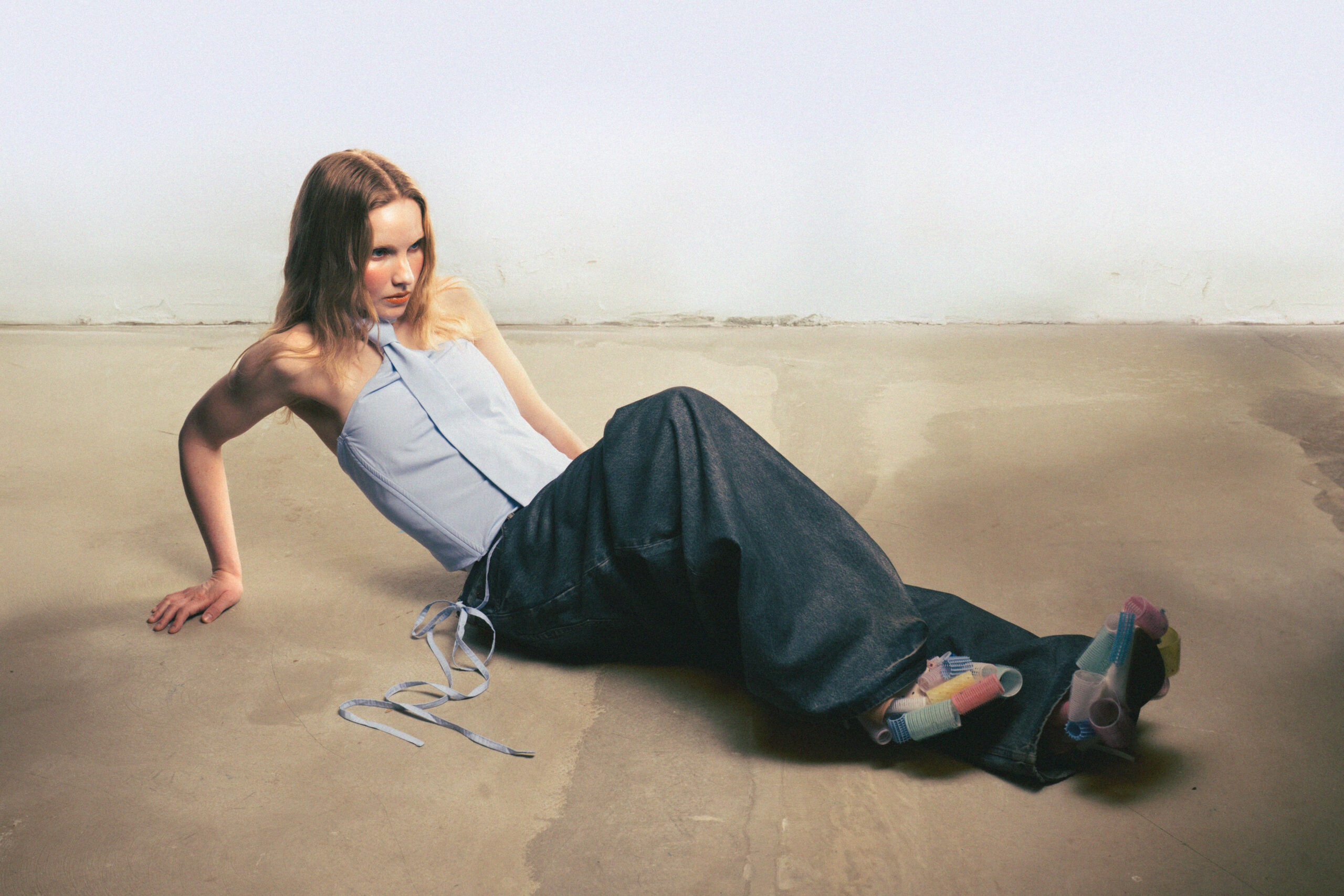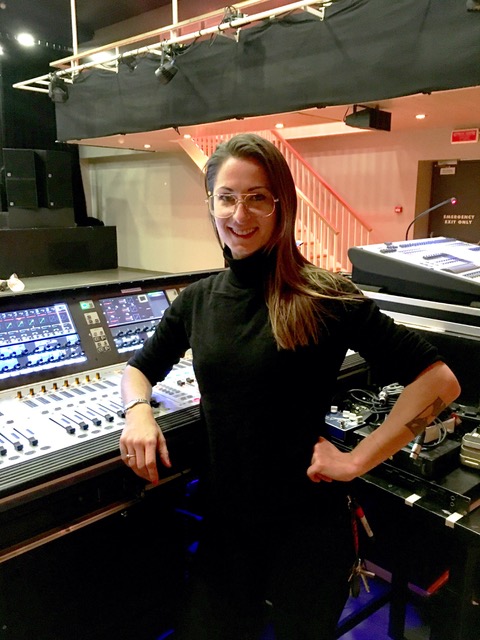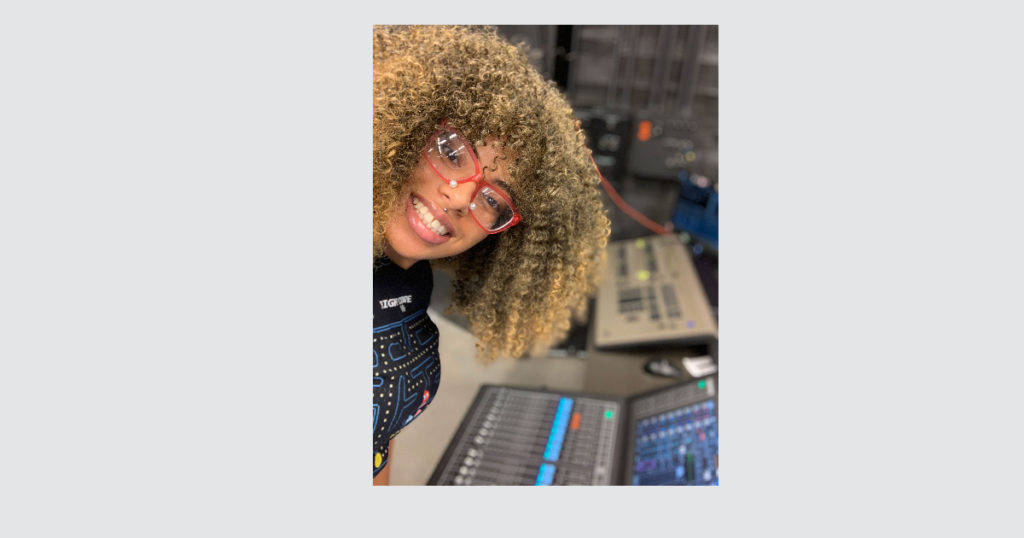Thea Gustafsson currently records emotive alt-pop as Becky and the Birds, a project which released its debut album Only Music Makes Me Cry Now on November 8th, 2024. As recent as this seems, she has a rich background in audio, from her days at Stockholm’s famed Musikmakarna Songwriters Academy to a later internship with Aviici. In 2025, Gustafsson was awarded Producer of the Year at the Swedish Grammis and in April, she released the single “Should’ve known better (choices),” on which her accordionist father contributes some accompaniment.
What excites you most as a producer?
What really excites me is when I go into sounds, or twists in the sounds that are unexpected—like changing the key abruptly, or using an effect that comes in just every now and then. I love very petite changes that make a big difference in production. Every time I hear a production where I can hear that someone has put a lot of time into it, and it’s complex, it just makes me so happy.
What are some of your favorite subtle shifts that you can accomplish in a recording?
I like to put in small, hidden messages. It could be a voice sample that only I know where it comes from—like a phone call—then I just take one word from that phone call, for example, and use it as a snare. It’s things that no one else probably would hear or notice. It makes such a difference in the process of creating it. But then I really like to play with my own voice, see how I can pitch my voice, flex time my voice, or use it in various ways. That’s probably why I love samplers so much, because you never know what you’ll get. You know what you put into the sampler, but then, from there, it just gives you so many endless possibilities. Samplers: they’re my best friends.
What is your go to sampler?
I love the Serato sampler. When I got it, it was free, which was incredible. I also use the (Teenage Engineering) OP-1 a lot. I’ve been using (Native Instruments) Maschine quite a lot to chop up stuff, but I don’t find it to be quite as easy. It’s not a standalone. I’ve tried to, like, really love it–and I used to love it–but I don’t love it as much anymore. I like Maschine for drums. It’s easy to quantize, but it’s also kind of complex. You need to really learn the Maschine, and, to be honest, I’m not much of a nerd when it comes to, like, learning the instrument. I just want them to work, or if I don’t know how they work, I want them to be easy to just figure out somehow.
Tell us about your experience producing other artists.
I’ve had sessions with people where we come from different worlds, and I think that could be good. But so far, my best experiences have been with the people who have similar taste and sound. We have similar thoughts. When you find that, it’s just fun. I think it’s good as a producer too, or as an artist, to get out of your own head. You can learn so much [from] someone saying a sound that they want you to use, and it might be a sound that you have never thought of or that you would never use, but you learn so much from just trying to find that. Then I’ve been making a lot of samples for other producers, which has been really fun. It’s easy to sit and be like, “oh, I need to make a whole production of something,” but I’ve also found a way where I’m, creating ambiences–or creating soundscapes, in a way–and then I let someone else come in to make the drums or the bass. The process of adding bass is very boring to me. I’ve been quite forceful too, in my no’s. I’ve not been afraid to say no, which has been good for me as a producer. I used to jump into projects, but it’s easy to find yourself kind of scattered if you’ve done a lot of different things that you’re not really keen on.
How did you get started as a producer?
Actually, I went to a production and songwriting school, but I went in there as a top liner. This was in Sweden, and it’s a quite good school. It’s the school that a lot of good producers and songwriters have gone to, but I didn’t even know the concept of producing, so I picked top liner, But then as I got into that school and I started to write, and I wrote for others, ended up always finding myself nagging at the producer, like, “Oh, you should try this. You should do this.” It was always male producers. I hadn’t seen a woman produce at that point. I didn’t really have any influencers or anyone that I could look up to, besides maybe Björk back then. It kind of grew out of frustration, because I saw these men just came into the studios and took over, and I didn’t even think they were good at what they were doing. So then, after a while, I kind of locked myself in, because I was so tired of everything. And I was like, I don’t want to be a top liner; this is not for me.
I started to produce by myself, because I had learned so much, because I had seen others produce. I remember that I wanted to do my artist project, but I couldn’t find a producer for it. I was just standing in line for these male producers. I had to wait, then they would start something, but they wouldn’t finish it. So then I was like, I’ll just do it myself. I did it out of anger, but also out of pure excitement. I immediately was just so blown away, like, “oh my god, why haven’t I done this sooner?” It’s one of the few things in life where I really get caught up in it, and I can just lose myself completely. Up to that point, I hadn’t really felt that feeling. It was so much fun to not know a lot about it either, because that gave me so much freedom and space to try things out, which made me ultra creative. Then, from there, I found my own ways of doing it. I remember a guy looking through my project, and he was like, “you can’t have the compressor first and then the EQ, that’s wrong.” And I was like, “Who says that it’s wrong?”
Do you still put the compressor before the EQ?
I actually put the EQ before the compressor most of the time. I know more common rules of what sounds good and what doesn’t sound good, but it’s so easy to get caught up in the rules of producing, and just forget about the creativity and the endless possibilities that are there if you actually put the compressor before the EQ [sometimes]. And it might be a sound that is way cooler than the compressor after the EQ.
Can you say the name of the school that you went to?
Musikmakarna. It’s a really good school. They split you up in groups, you know, so you’re either a “top liner” or a producer, which makes it weird. It’s weird when that’s your first interaction with the industry. You suddenly have to put yourself into a box. I think that limits you, like, “well, if I’m a top liner, I can’t be a producer.” I do think a lot of things have changed, though. This was quite a lot of years ago. I love the word creator; I just want to be a creator. And I think that, especially as a girl and as a woman, too, it’s easy to forget that you can do everything. I think society enforces [men] to be like, “I can do whatever I want,” but as a girl, you have to make everything perfect before you can say that you’re a producer. You have to produce a hit record before you can say that you’re a producer. I’m just trying to work around that all the time, and [as] soon as I try something, I’m like, “I’m that.”
Do you have someone who really helped you, like a mentor?
I didn’t really have anyone who I can say was, like, a mentor, but I did feel a lot of encouragement from people who were in the industry–from other women producers especially. I think there’s a lot of connection there, from female creators overall. I’ve found a lot of calm in talking to other girls who are making something creative, because it takes a lot from you to put yourself out there. It’s kind of vulnerable as a woman. So to see other girls being powerful, and being nerdy, or being deeply interested in something that doesn’t have anything to do with men, is very inspiring to me. Every woman, who’s making something for their own sake, has always been very inspiring to me.
So tell us about your process for making your latest album.
I was going through a breakup, and I’ve never been a big diary writer. My way has been to record myself when I’m playing piano and singing, so I did that a lot, and I just let whatever wanted to come out, come out. It came from this very intuitive place. So I would have long recordings, like 30 minutes that I had recorded, that I then took and sampled. I let those samples kind of lead the way for the whole album. Then I would add production to it, I would add drums or whatever it needed, which was hard, because a lot of them didn’t even have BPMs or a tempo. Some of them still don’t, which I have found, very freeing in a way, because I just had to accept that. Once I let go, I was like, oh, it can be whatever it wants to be.
What are some of your long term goals?
I really want to work with people, with big people, who are interesting and inspiring. I want to get more into hip hop, and use my samples there, and also more into the alternative scene, [producing] for others. I want to produce even more for others, and then release more albums. I’m moving to the US, which will be terrifying, and so much fun. I really also want to pave the way for female producers. I just want to be inspiring, and I want to stay inspired, too.
What made you gravitate toward music to begin with?
My dad is a musician, but he’s an accordion player, and he’s been very much into klezmer music and jazz. So I always started out as a little bit of an underdog, you know, because I was just listening to his records, which were klezmer records, all day long. Then I started playing violin when I was seven. I played in a lot of orchestras, and I was also writing songs for orchestras, which was my first way of expressing creativity and making songs. I think that has had a huge impact on the way that I produce, too, because I come from an orchestra perspective, and I’ve also always been singing in choirs. From that, I’m very used to different harmonies and different sections, which I’ve had a big use for in my production. I’ve always been in music, I’ve always been around music, and I think if I would have known that it was possible to produce earlier, I definitely would have. It was just that I didn’t even know that you could do it until school.
Your choir background definitely comes across in your album.
Yeah, I love choirs. It’s so much fun singing with other people. The beautiful thing about vocals is that it’s an instrument that is closest to us, because it comes right out of us; there’s no instrument in between. It’s just straight from our soul. I find that if I’ve been in an era where I’ve been only producing a lot and I haven’t been singing so much, I can feel how I’m disconnected from myself, almost. I really think singing connects you to you somehow. It’s just beautiful.
More on Thea Gustafsson
New single announcement: April 30th, 2025
https://www.instagram.com/beckyandthebirds/



